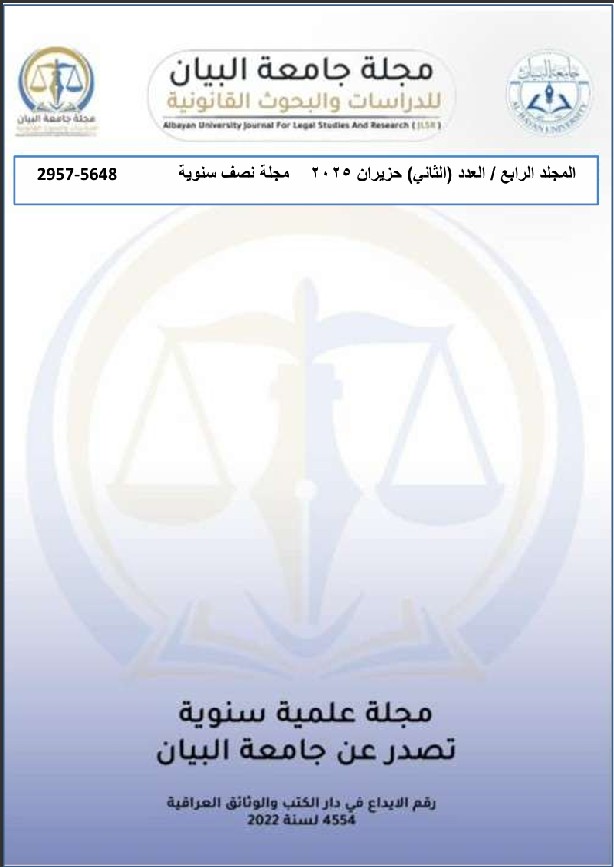Conflict of judicial rulings in Iraq (a comparative study)
DOI:
https://doi.org/10.65263/ch155y90Keywords:
Conflict of jurisdiction, body for appointment of jurisdiction, conflict of judgments, administrative judiciary.Abstract
There is no doubt that the dual judiciary system offers several advantages; however, it is not without legal complications. One of the most prominent issues is the conflict of judicial decisions, which arises when two different judicial bodies adjudicate the same dispute and issue two final and contradictory rulings. This results in a state of legal uncertainty and undermines the authority of res judicata and the stability of rights. Some countries, such as France and Egypt, have addressed this issue through legislative regulation, establishing preventive mechanisms to avoid such conflicts and appointing competent authorities to resolve them when they occur. In contrast, although the Iraqi legislator has adopted the dual judiciary system, it has not explicitly provided for a mechanism to address this type of jurisdictional conflict. This differs from comparative legal systems (France and Egypt), which have clearly and independently defined the conflict of judgments as a form of jurisdictional dispute, subject to adjudication by the competent judicial body for jurisdictional conflicts. Moreover, Iraq’s Authority for Determining Jurisdiction (body for appointment of jurisdiction) has never previously encountered or adjudicated such a case. This situation creates a legislative vacuum that necessitates attention and remedy by the legislator, especially considering the continuous development and expansion of administrative judiciary in Iraq, alongside the adoption of a federal system, both of which may give rise to instances of conflicting judgments. In such cases, it appears that the Authority for Determining Jurisdiction—despite the lack of an explicit legal provision—remains the most appropriate body to resolve the conflict of judgments, as it is entrusted with jurisdictional disputes between the two sides of the judiciary. However, the legal dilemma persists when the conflict arises between two judicial bodies, one belonging to the federal judiciary and the other to the judiciary of a region. In this context, the Federal Supreme Court emerges as the competent authority to adjudicate jurisdictional conflicts between the federal judiciary and the judicial bodies of the regions
References
First: Legal Legislation
A-Iraqi Legislation
1. Constitution of the Republic of Iraq of 2005.
2. Civil Procedure Law No. 83 of 1969.
3. Judicial Organization Law No. 160 of 1979, as amended.
4. Law No. 106 of 1989, Second Amendment to State Council Law No. (65) of 1979.
5. Law No. 17 of 2013, Fifth Amendment to State Council Law No. (65) of 1979.
6. Law No. 25 of 2021 (First Amendment) to Order No. 30 of 2005 – Federal Court Law.
B- Foreign Legislation
1- French Law of August 16 and 24, 1790 (Concerning Judicial Organization).
2- Law of May 24, 1872, concerning the French Court of Conflicts
3- Law of April 20, 1932, concerning the opening of appeals before the French Court of Conflicts against final rulings issued by judicial and administrative courts when they result in a denial of justice
4- Constitution of the Arab Republic of Egypt of 2014
5- Egyptian Supreme Constitutional Court Law No. 48 of 1979.
Second: Legal Books
1- Burhan Zureiq, Principles and Rules of Administrative Judicial Procedures, 1st ed., Legal Library, Damascus, 2011.
2- Muhammad Fuad Abdul Basit, Administrative Judiciary, New University Publishing House, Alexandria, 2005.
Third: Research and Advisory Studies in Academic Journals
1- Ahmed Khalil, Conflict between Judicial Rulings (Assumptions of Conflict and Means of Prevention, Treatment, and Methods), a study published in the Journal of Law for Legal and Economic Research, Faculty of Law, Alexandria University, Issues 1-2, January 1997.
2- Basil Shabr Hassan Al-Mousawi, Ismail Sa'sa' Eidan Al-Badri, Competencies of the Authority for the Appointment of the Authority in Iraq - A Comparative Study, a study published in the Uruk Journal for Humanities, Volume 15, Issue 7, Al-Muthanna University, 2022.
3- Bou Omran Adel, "Resolving the Problems of Conflict of Jurisdiction between the Administrative Judiciary and the Ordinary Judiciary in the Algerian Legal System," a study published in the Journal of Political and Legal Notebooks, Issue 8, January 2013.
4- Fahima Marzouki, "The Role of the French Court of Conflicts in Resolving Problems of Jurisdiction," a study published in the Journal of Law, Issue 3, 2017. Marwa Muwaffaq Mahdi, "The Authority Responsible for Resolving Conflicts of Jurisdiction between the Administrative and Ordinary Judiciaries in Iraq," a study published in the Journal of Legal Sciences, College of Law, University of Baghdad, Special Issue for Faculty and Graduate Students (1), 2020.
5- Mayada Abdul Qader Ismail, "Conflicts between Rulings in Constitutional Judiciary: A Comparative Study in Light of the French Court of Conflicts," Journal of Law for Legal and Economic Research, Issue: 1, July 2024.
Fourth: Doctoral Dissertations and Master's Theses
1- Ibrahim Jabbar Mansour, "Resolving Conflicts of Jurisdiction Between the Civil and Administrative Judiciaries," Master's Thesis, Faculty of Law, Islamic University of Lebanon, 2018.
2- Bou Aziz Ramzi, The Role of the Conflict Court in Regulating the Rules of Jurisdiction, Master's Thesis, University of May 8, 1945, Guelma, Faculty of Law and Political Science, Department of Law, 2020.
3- Maysoun Ali Al-Hadi Al-Hasnawi, The Legal Organization of the Supreme Administrative Court in Iraq - A Comparative Study, PhD Thesis, Al-Nahrain University, Faculty of Law, 2015.
Fifth: Articles Published on the Internet:
1- Atheer Hamza Al-Sharifi, Appeal Before the Administrative Judiciary Court Under Special Laws, published on the Internet, available at the following link: https://mail.almerja.com/reading.php?idm=221064
Downloads
Published
Issue
Section
License
The authors retain Full copyright of their published article
Al-Bayan University Journal for Legal Studies and Research (AUJLSR) applies the Creative Commons Attribution 4.0 International (CC BY 4.0) License to articles and other works we publish. If you submit your paper for publication by AUJLSR, you agree to have the CC BY 4.0 license applied to your work.
Articles can be read and shared for under the following conditions:
BY: Attribution must be given to the original source (Attribution)
Full details available at
https://creativecommons.org/licenses/by/4.0/



